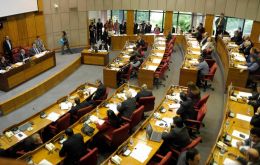MercoPress. South Atlantic News Agency
Tag: Soybean export
-
Tuesday, April 4th 2023 - 21:30 UTC
Brazil ready to supply Argentina with soybeans for the its crushing industry

Brazil has enough potential to supply up to half of the soybeans that Argentina will import to keep its industrial park running in the face of the historic drought that ravaged the 2022/23 crop in the country, which is usually the largest exporter of soy oil and soy meal in the world.
-
Wednesday, April 29th 2020 - 07:41 UTC
China's imports of Brazilian soybeans drop 24.8% during March over a year ago

Brazilian soybeans imports to China during the month of March dropped 24.8%, over the same month last year. The data was released by the Chinese General Customs Administration last Sunday, April 26, and shows soy imports from Brazil reached 2.1 million tons in March, compared to 2.79 million tons in the same period last year.
-
Wednesday, April 24th 2019 - 11:36 UTC
Argentina trying to sell its soy bumper crop to China

Argentina is pushing to increase agricultural trade with commodities-hungry China, as farmers on the country’s Pampas grains belt prepare for what is expected to be a bumper soybean harvest over the weeks ahead.
-
Monday, March 4th 2019 - 21:39 UTC
Brazil's 2018/19 soy exports forecasted to decline : smaller crop and domestic prices higher

Brazil’s soybean exports are expected to come in 14-18% down on the year in 2019 due to lower production and reduced buying by China, industry reports showed.
-
Wednesday, April 25th 2018 - 08:50 UTC
Paraguay soy farmers hopeful newly elected Senate will not slap levy on exports

Paraguay's business-friendly ruling party lost fewer seats in Sunday's Senate election, than expected, ensuring strict fiscal policies while lessening chances of a tax hike on the key soy sector. Farmers in the world's No. 4 soybean exporter had feared that the new Senate might approves a measure, defeated last year, that would slap a 10% levy on exports.
-
Saturday, January 20th 2018 - 09:26 UTC
Argentina drastically slashes docking services to lower exports' costs

Argentina has set a maximum rate paid for port docking and undocking services, the government said in its official gazette, a change the Transportation Ministry said would slash docking costs by up to 40%. The move comes as President Mauricio Macri seeks to lower the cost of exporting food from the world’s No. 3 soy and corn exporter and the leading shipper of soybean livestock feed.
-
Wednesday, January 3rd 2018 - 10:19 UTC
Lack of rainfall in Buenos Aires province affecting soy planting and prices

Argentina's bread-basket province of Buenos Aires will remain mostly dry over the days ahead, meteorologists said on Tuesday, after reporting scant rains over the weekend in the country's biggest and most productive farm area.
